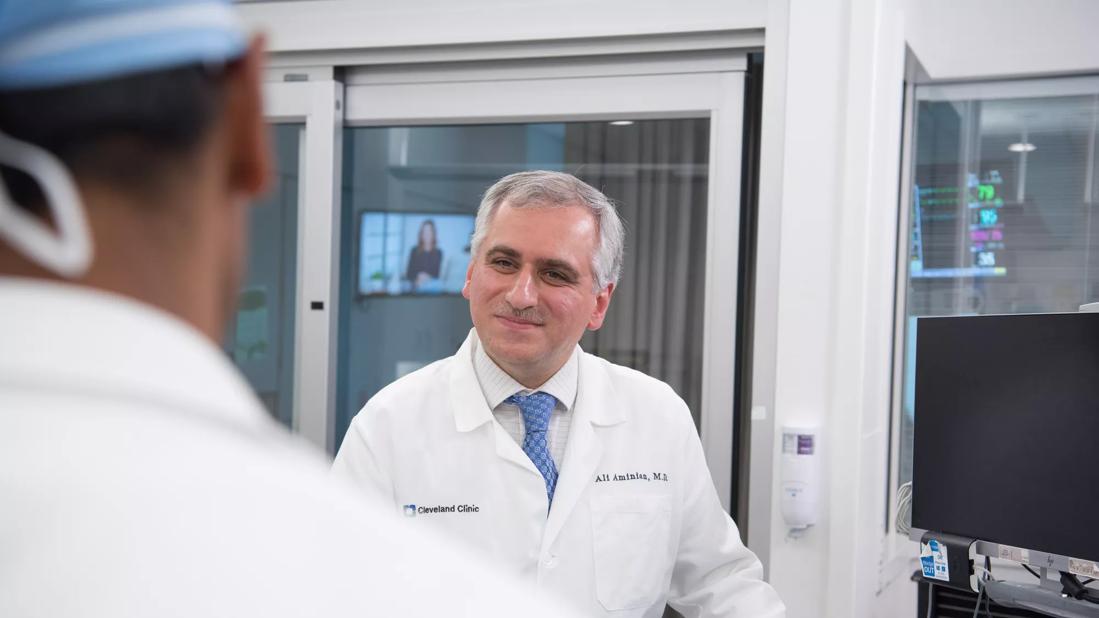Leader plans to collaborate with other medical disciplines for the benefits of patients with obesity.

After an extensive search for a chief of Cleveland Clinic’s Bariatric and Metabolic Institute, Ali Aminian, MD, was named to the leadership position. Since joining the Cleveland Clinic in 2012, he has worked diligently to improve the safety and quality of bariatric surgical procedures.
Advertisement
Cleveland Clinic is a non-profit academic medical center. Advertising on our site helps support our mission. We do not endorse non-Cleveland Clinic products or services. Policy
Now at the helm of one of the most comprehensive programs of its kind, Dr. Aminian is positioned to focus the institute’s impressive resources on making major contributions to patient care, research, and education.
I believe it’s our team-based, multidisciplinary approach to patient care. Although we perform about 750 laparoscopic bariatric surgical procedures a year, we are not purely a surgery-driven program. Every new patient with obesity and metabolic disease is seen by a medical obesity specialist, psychologist, and nutritionist, who create an individualized weight-loss program. When weight-loss surgery is needed, the team follows each patient closely before and after the surgery to ensure maximum weight loss is safely achieved and sustained.
The expertise of our surgical team is another strength. We take excellent care of the most complicated patients; for example, those with severe obesity who need to lose weight before organ transplantation and those referred for corrective surgery after experiencing postoperative complications.
Research is an integral part of what we do. We have one of the most productive research programs in the country.
Our clinical research team is focusing on the safety and efficacy of a variety of surgical procedures for patients with different conditions. Specifically, we are trying to identify which factors enable patients to benefit from a particular procedure. Answers will allow us to match individuals with the most appropriate surgical procedure.
Advertisement
Our basic scientists are working to identify the mechanisms by which bariatric operations lower disease risk. Currently, they are transferring fecal samples from pre- and post-bariatric surgery patients to mouse models of fatty liver disease and diabetes. Fecal microbes taken prior to surgery should give sterile animals the metabolic disease, and those taken after surgery should cure diseased animals. Understanding how these metabolic conditions occur and how to treat them should enable us to develop less-invasive treatment options.
Yes, our comprehensive approach provides excellent training for our long-running fellowships in bariatric surgery, bariatric psychology, and clinical and translational research. We hope to add an obesity medicine fellowship in the next year or so.
During the initial phase of the outbreak, Cleveland Clinic requested that all elective operations be temporarily stopped to protect patients and caregivers and allow for potential reallocation of PPE and other resources. During this hiatus, we categorized our patients by severity of obesity and comorbidities and published our staged approach for safely reintroducing bariatric surgery in a COVID-19 environment.
On May 11, we resumed performing bariatric procedures using this approach and are now back to pre-COVID capacity. Cleveland Clinic is a very safe place for all patients, including those with severe obesity.
In the last few months, we learned that patients with obesity are disproportionately affected with a severe form of COVID that increases the risk of death. Bariatric surgery can be a lifesaving procedure for many patients with severe obesity, in addition to providing substantial and sustained weight loss. Given these benefits, it should be not considered cosmetic or non-essential surgery.
Advertisement
My vision for the Bariatric and Metabolic Institute is for it to be the best place for the specialized and integrated care of patients with obesity and the best place in the world for a caregiver to work in the field of obesity.
One of my goals is to improve access to care. Based on estimates, only 1% to 2% of eligible patients undergo bariatric surgery. There’s certainly room for improvement here. We are in the process of building strong clinical and academic relationships with other disciplines at Cleveland Clinic, including internal medicine, family medicine, endocrinology, cardiology, orthopedic surgery and others in order to benefit our patients. We must continuously and relentlessly monitor and improve the quality and safety of our care, in addition to the patient experience, as well.
Advertisement
Advertisement

Multidisciplinary framework ensures safe weight loss, prevents sarcopenia and enhances adherence

Study reveals key differences between antibiotics, but treatment decisions should still consider patient factors

Key points highlight the critical role of surveillance, as well as opportunities for further advancement in genetic counseling

Potentially cost-effective addition to standard GERD management in post-transplant patients

Findings could help clinicians make more informed decisions about medication recommendations

Insights from Dr. de Buck on his background, colorectal surgery and the future of IBD care

Retrospective analysis looks at data from more than 5000 patients across 40 years

Surgical intervention linked to increased lifespan and reduced complications